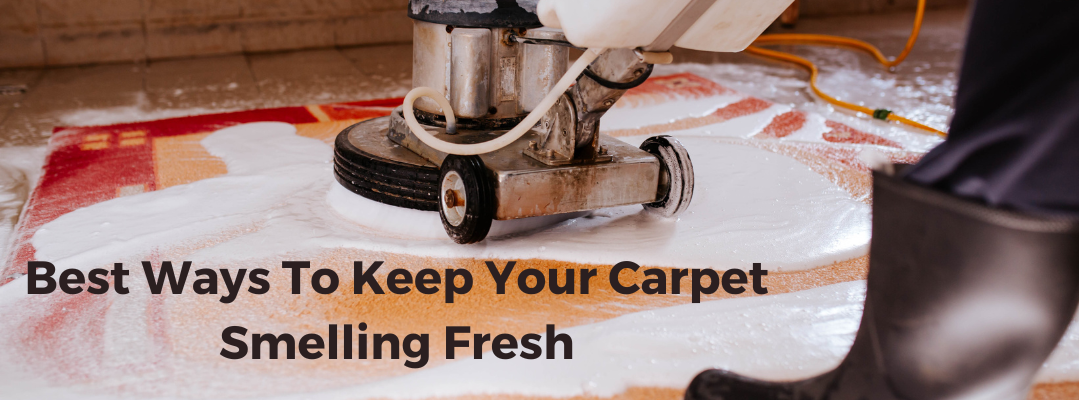
Best Ways To Keep Your Carpet Smelling Fresh
A well-kept carpet not only gives a welcoming warmth to your home, but also contributes to a nice and comfortable ambience. Carpets, on the other hand, can absorb diverse scents and create a less-than-pleasant fragrance with time. Maintaining a fresh-smelling carpet involves a combination of regular cleaning routines and strategic techniques, whether it’s the aftermath of a spilled drink, pet mishaps, or simply the natural accumulation of ordinary living. In this guide, we will explore the best ways to keep your carpet smelling as good as new. From the ultimate list of ideas to natural remedies, you will learn how to get rid of odours and keep your carpet a lovely and welcoming element that enhances your living spaces. Say goodbye to musty and stale aromas; it’s time to embrace a fresher ambience that uplifts your home environment and makes every step a pleasurable experience.
1: Regular Vacuuming Of The Carpet
Vacuuming on a regular basis is essential for maintaining the appearance and aroma of your carpet. Dirt, dust, pet dander, and other debris accumulate on the carpet fibres as you and your family move around the house. These particles can degrade over time and emit odours, creating an unpleasant environment. By cleaning your carpet on a regular basis, you can eliminate these particles before they can contribute to unwanted odours. Use a vacuum with a high-efficiency particulate air (HEPA) filter to ensure that allergens and microscopic particles are efficiently caught and not recirculated into the air. Pay extra attention to high-traffic areas and locations where your pets spend time, as these are more likely to harbour odour-causing substances.
2: Steam Cleaning
Steam cleaning is an exhaustive and effective procedure for not just cleaning but also deodorising your carpet. The procedure involves injecting a solution of hot water and cleaning the solution deep into the carpet fibres, agitating the dirt and debris, and then extracting both the solution and the loosened impurities. This method not only removes dirt and stains but also removes bacteria and odour sources that may be trapped within the fibres. The combination of heat, moisture, and cleaning agents aids in the breakdown of organic materials responsible for odours. Professional steam cleaning services use specialised equipment that can reach deeper layers of the carpet, resulting in a more comprehensive and long-lasting freshness.
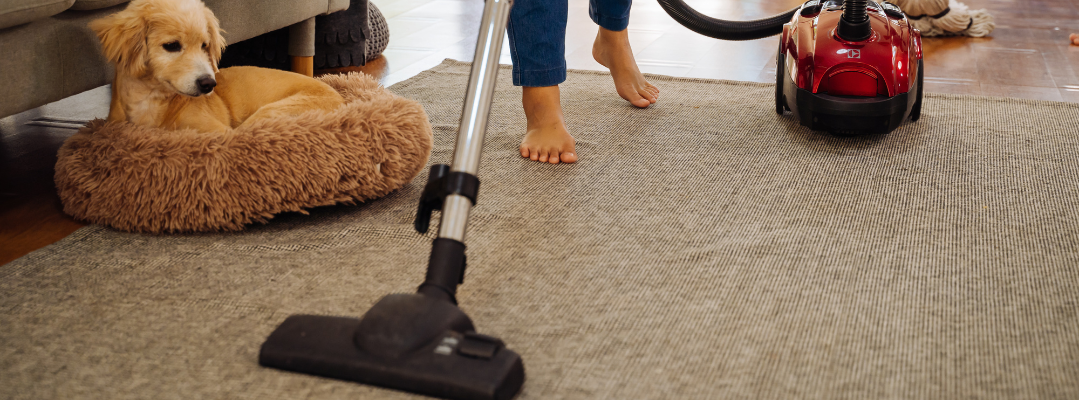
3: Deep Clean Occasionally
While regular vacuuming and steam cleaning are important, giving your carpet a deep clean on an occasional basis can add an extra layer of odour control. Deep cleaning entails utilising carpet cleaner equipment that injects a cleaning solution into the carpet fibres and then removes it along with the loosened dirt and grime. This method reaches regions that regular cleaning may miss, efficiently removing deeply embedded particles that contribute to odours. It’s especially useful in houses with a lot of foot traffic, households with pets, or areas that are prone to spills and stains. The end result is a revitalised carpet that not only appears clean but also smells good.
4: Good Ventilation
A well-ventilated environment is extremely important for keeping odours at bay in your carpet. Stagnant air can trap moisture, resulting in mould growth and musty odours. Proper ventilation ensures that fresh air circulates throughout your home, reducing the accumulation of undesirable odours. Open windows whenever possible, especially after cleaning or during humid weather, to facilitate cross-ventilation. In rooms with few windows, use fans to keep the air circulating. Consider installing air purifiers with HEPA filters to help catch airborne particles and allergens, contributing to a cleaner and fresher indoor environment.
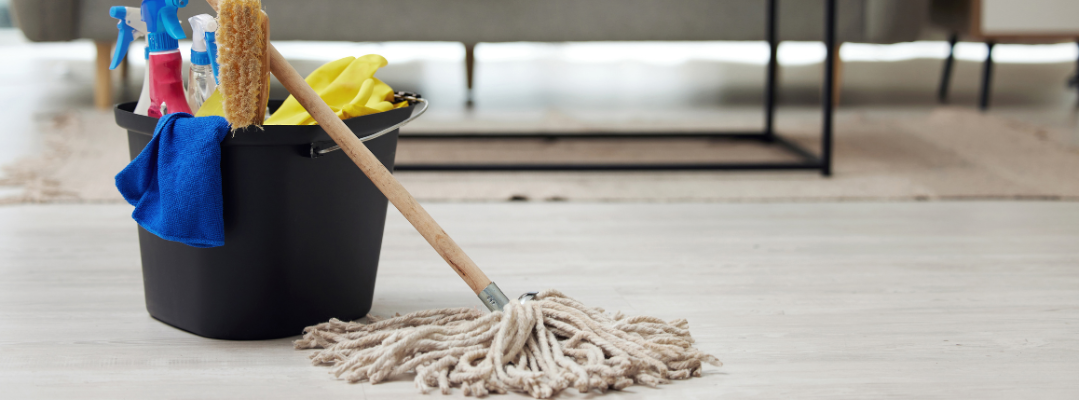
5: Remove Shoes At The Door
Humidity is a frequent contributor to the formation of musty odours and mould growth. Moisture can accumulate in your home in humid climates or during rainy seasons, particularly in areas with poor ventilation. The excess moisture creates an excellent habitat for odours to thrive. Using a dehumidifier helps control indoor humidity levels, lowering the probability of mould growth and accompanying odours. By maintaining an ideal humidity level, you produce an atmosphere that is less favourable to the formation of odour-causing bacteria and mould spores.
6: Use A Dehumidifier
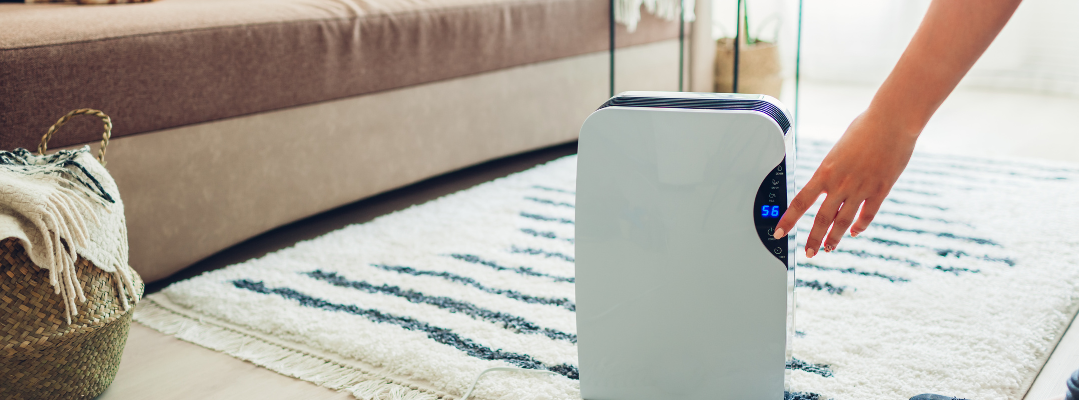
7: Limit Activities That Cause Odours
8: Use Rugs
Rug placement in high-traffic areas and entryways can help extend the life of your carpet and keep it feeling fresh. Rugs serve as a protective barrier, trapping dirt and debris that would otherwise make their way into carpet fibres. Rugs prevent these particles from sinking deep into the carpet by trapping them at the surface, minimising the possibility of odour production. Rugs are much easier to clean and maintain than wall-to-wall carpeting, allowing you to shake them out, wash them, and even replace them as needed. Choose rugs that are machine-washable or easy to clean to guarantee that they remain successful at protecting the freshness of your carpet.
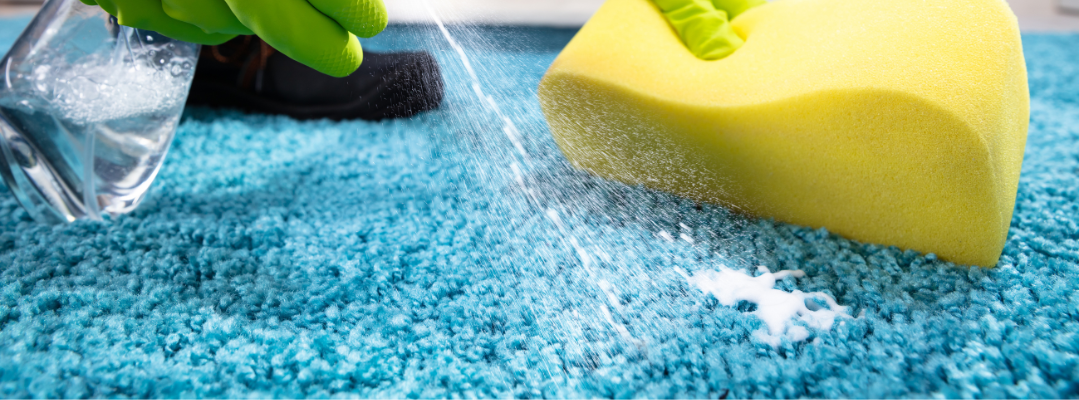
Natural Remedies To Make Your Carpets Smell Good
- Sprinkle Baking Soda
Baking soda, a common household essential, has exceptional deodorising properties that may easily revitalise your carpets. To use this natural solution, generously sprinkle a layer of baking soda evenly over the surface of your carpet. Baking soda works by absorbing and neutralising a wide range of odours, from pet odours to cooking aromas that may have entered the fibres over time. Allow the baking soda to sit for many hours or even overnight, to do its job. During this time, the baking soda molecules attract and bond to odour-causing particles, neutralising their effects. After the specified time has passed, thoroughly vacuum the carpet to remove the now-infused baking soda. The result is a carpet that not only looks cleaner but radiates a noticeable freshness, making your living spaces more inviting.
- White Vinegar Solution
The natural acidity of white vinegar makes it an efficient and environmentally safe alternative for removing carpet odours. In a spray container, combine equal parts distilled white vinegar and water to make a white vinegar solution. Mist the afflicted regions of your carpet lightly with this solution, being careful not to oversaturate the fibres. As the vinegar solution dries, it not only neutralises existing odours but also combats the bacteria and germs that are frequently associated with them. The vinegar smell fades as it dries, leaving behind a cleaner, odour-free carpet. This method not only treats the source of the odours but also improves the overall sanitation and freshness of your carpeted environments.
- Citrus Peels
Citrus peels, which are high in natural essential oils, provide an aromatic and appealing way to revitalise your carpets. Collect the peels from any citrus fruits you have on hand, such as oranges, lemons, grapefruits, or limes. Allow the peels to dry completely before grinding them into a fine powder. Sprinkle this powdered citrus mixture over your carpet and leave it for an hour or more to allow the essential oils in the peels to interact with the carpet fibres. Citrus essential oils have inherent deodorising capabilities that not only hide but also replace existing odours with a refreshing and stimulating scent. After the specified time has passed, vacuuming the powder reveals a carpet with a naturally uplifting citrus aroma.
- Use Essential Oils
Making use of the aromatic strength of essential oils to get rid of unfavourable carpet odours is a customisable and sensory-rich method. Begin by choosing an essential oil that speaks to you, such as lavender for relaxation, tea tree for antibacterial characteristics, eucalyptus for its energising perfume, or lemon for its bright and uplifting aroma. Combine a few drops of the essential oil of your choice with water in a spray bottle. Shake the mixture vigorously to achieve equitable dispersion. Mist your carpet lightly with this essential oil solution, being careful not to oversaturate it. Essential oils not only scent the air, but they also have natural antibacterial characteristics that help fight smells at their source. As the solution dries, the aromatic notes of the essential oil linger, creating a serene and harmonious atmosphere in your living spaces.
- Activated Charcoal
Activated charcoal, known for its absorptive properties, provides a natural and effective solution to long-lasting carpet odours. To use this cure, use small pouches packed with activated charcoal in areas where scents are most noticeable. Activated charcoal is highly porous and has the unique ability to attract and trap a wide spectrum of odour-causing particles. As air passes through the carpet strands, the activated charcoal works hard to absorb these particles, thereby neutralising their impact and replacing them with cleaner air. This procedure is chemical-free and ensures that your carpets remain fresh and free of undesirable odours. To ensure continued odour control, change the charcoal pouches on a regular basis.
Conclusion
Maintaining a fresh-smelling carpet is not only essential for the aesthetic appeal of your home but also for creating a healthy and inviting living environment. By adhering to the best practices mentioned above, such as regular vacuuming, steam cleaning, deep cleaning, proper ventilation, and the use of rugs, you can effectively combat the accumulation of dirt, bacteria, and odours that can plague your carpets over time. Implementing simple habits like removing shoes at the door and limiting activities that cause odours can go a long way towards preserving the cleanliness and scent of your carpets.
However, if you are seeking professional assistance to ensure a thorough and expert-level cleaning, then consider enlisting the services of Harry The Cleaner. With our expertise and specialised equipment, you can rest assured that your carpets will receive the attention they deserve, allowing you to enjoy a truly revitalised and fresh atmosphere in your home. Remember, a little care and attention to your carpets can make a big difference in maintaining a welcoming and pleasant living space for you and your loved ones.
